Lord, why did you tell me to love all men, my brothers?
I have tried, but I come back to you, frightened…
Lord, I was so peaceful at home, I was so comfortably settled.
It was well furnished, and I felt cozy.
I was alone, I was at peace.
Sheltered from the wind and the rain, kept clean.
I would have stayed unsullied in my ivory tower.
But, Lord, you have discovered a breach in my defenses.
You have forced me to open my door.
Like a squall of rain in the face, the cry of men has awakened me;
Like a gale of wind a friendship has shaken me.
stealing in like a shaft of light, your grace has disturbed me.
Rashly enough, I left my door ajar. Now, Lord, I am lost!
Outside, men were lying in wait for me.
I did not know they were so near; in this house, in this street,
in this office; my neighbor, my colleague, my friend.
As soon as I started to open the door I saw them with outstretched
hands, anxious eyes, longing hearts,
like beggars on church steps.
The first came in, Lord. There was, after all, a bit of
space in my heart.
I welcomed them. I would have cared for them and fondled them,
my very own little lambs, my little flock.
You would have been pleased, Lord; I would have served and
honored you in a proper, respectable way.
Until then, it was sensible…
But the next ones, Lord, the other men — I had not seen them;
they were hidden behind the first ones.
There were more of them. They were wretched; they overpowered me
without warning.
We had to crowd in, I had to find room for them.
Now they have come from all over in successive waves,
pushing one another, jostling one another.
They come from all over town, from all parts of the country,
of the world; numberless, inexhaustible.
They don’t come alone any longer but in groups, bound one to another.
They come bending under heavy loads; loads of injustice, of resentment
and hate, of suffering and sin…
They drag the world behind them, with everything rusted, twisted,
badly adjusted.
Lord, they hurt me! They are in the way, they are all over.
They are too hungry; they are consuming me!
I can’t do anything anymore; as they come in, they push the door,
and the door opens wider…
Ah, Lord! My door is wide open!
I can’t stand it anymore! It’s too much! It’s no kind of a life!
What about my job?
My family?
My peace?
My liberty?
and me?
Ah, Lord! I have lost everything; I don’t belong to myself
any longer;
There’s no more room for me at home.
Don’t worry, God says, you have gained all,
While men came in to you,
I, your father,
I, your God,
Slipped in among them.
— From Prayers by Michel Quoist
(I found this in a folder that contains my father’s sermons. He typed it and kept it, so it must have meant something to him. Miss you, Dad; 1925 – 1996.)



